|
|
|
Sort Order |
|
|
|
Items / Page
|
|
|
|
|
|
|
| Srl | Item |
| 1 |
ID:
157510
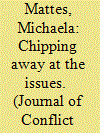

|
|
|
|
|
| Summary/Abstract |
Disputants might resolve their disagreements in a piecemeal fashion, addressing a subset of the issues at a time. How viable is such a strategy? I argue that partial settlements signal the desire to resolve disagreements and can lay the foundation for additional cooperation by building trust and/or demonstrating the benefits of dispute resolution. As a result, partial settlements should be associated with the resolution of remaining disagreements. Yet, scholars have questioned whether pursuing a piecemeal approach may be more harmful than helpful, and a systematic empirical test of these competing predictions is necessary. Using data from worldwide territorial claims between 1919 and 2001, I find a strong positive correlation between partial settlements and comprehensive dispute resolution. In the shorter run, partial settlements are also associated with an increased likelihood for peaceful negotiations, but there is only limited evidence that they reduce conflict before all aspects of the claim are resolved.
|
|
|
|
|
|
|
|
|
|
|
|
|
|
|
|
| 2 |
ID:
157508
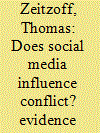

|
|
|
|
|
| Summary/Abstract |
How does international public support via social media influence conflict dynamics? To answer this question, I construct a unique, extremely disaggregated data set drawn from social media sources to examine the behavior of Israel and Hamas during the 2012 Gaza Conflict. The data set contains conflict actions and international audience behavior at the hourly level for the full 179 hours of the conflict. Notably, I also include popular support for each side from international audiences on social media. I employ a Bayesian structural vector autoregression to measure how Israel’s and Hamas’s actions respond to shifts in international public support. The main finding is that shifts in public support reduce conflict intensity, particularly for Israel. This effect is greater than the effect of the key international actors—United States, Egypt, and United Nations. The results provide an important insight into how information technology is changing the role of international audiences in conflict.
|
|
|
|
|
|
|
|
|
|
|
|
|
|
|
|
| 3 |
ID:
157509
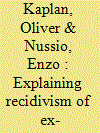

|
|
|
|
|
| Summary/Abstract |
What determines the recidivism of ex-combatants from armed conflicts? In postconflict settings around the world, there has been growing interest in reintegration programs to prevent ex-combatants from returning to illegal activities or to armed groups, yet little is known about who decides to “go bad.” We evaluate explanations for recidivism related to combatant experiences and common criminal motives by combining data from a representative survey of ex-combatants of various armed groups in Colombia with police records of observed behaviors that indicate which among the respondents returned to belligerent or illegal activities. Consistent with a theory of recidivism being shaped by driving and restraining factors, the results suggest that factors such as antisocial personality traits, weak family ties, lack of educational attainment, and the presence of criminal groups are most highly correlated with various kinds of recidivism and hold implications for programs and policies to successfully reintegrate ex-combatants into society.
|
|
|
|
|
|
|
|
|
|
|
|
|
|
|
|
| 4 |
ID:
157507


|
|
|
|
|
| Summary/Abstract |
The International Criminal Court (ICC) is responsible for prosecuting crimes against humanity, war crimes, and genocide. Despite the potential for the ICC to deter human rights abuses, scholars and policy makers are divided on the effectiveness of it. This debate, however, is plagued by some important theoretical and empirical limitations. I address the problems in the literature and evaluate whether the ICC can prevent human rights abuses. I argue that the ICC can deter governments from committing human rights violations by imposing a variety of costs on them throughout their investigations that decrease their expected payoffs for engaging in human rights abuses. Across a variety of statistical estimators that account for standard threats to inference and several anecdotes, I find strong support for my theoretical expectations; leaders from states that have ratified the Rome Statute commit lower levels of human rights abuses than nonratifier leaders.
|
|
|
|
|
|
|
|
|
|
|
|
|
|
|
|
| 5 |
ID:
157514
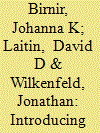

|
|
|
|
|
| Summary/Abstract |
The article introduces the All Minorities at Risk (AMAR) data, a sample of socially recognized and salient ethnic groups. Fully coded for the forty core Minorities at Risk variables, this AMAR sample provides researchers with data for empirical analysis free from the selection issues known in the study of ethnic politics to date. We describe the distinct selection issues motivating the coding of the data with an emphasis on underexplored selection issues arising with truncation of ethnic group data, especially when moving between levels of data. We then describe our sampling technique and the resulting coded data. Next, we suggest some directions for the future study of ethnicity and conflict using our bias-corrected data. Our preliminary correlations suggest selection bias may have distorted our understanding about both group and country correlates of ethnic violence.
|
|
|
|
|
|
|
|
|
|
|
|
|
|
|
|
| 6 |
ID:
157513
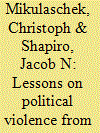

|
|
|
|
|
| Summary/Abstract |
A large literature has emerged in political science that studies the wars in Afghanistan and Iraq. This article summarizes the lessons learned from this literature, both theoretical and practical. To put this emerging knowledge base into perspective, we review findings along two dimensions of conflict: factors influencing whether states or substate groups enter into conflict in the first place and variables affecting the intensity of fighting at particular times and places once war has started. We then discuss the external validity issues entailed in learning about contemporary wars and insurgencies from research focused on the Afghanistan and Iraq wars during the period of US involvement. We close by summarizing the uniquely rich qualitative and quantitative data on these wars (both publicly available and what likely exists but has not been released) and outline potential avenues for future research.
|
|
|
|
|
|
|
|
|
|
|
|
|
|
|
|
| 7 |
ID:
157511


|
|
|
|
|
| Summary/Abstract |
Few studies explain how wars affect trade with third parties. We argue that wartime trade policies should raise trade with friendly and enemy-hostile third parties but reduce trade with hostile and enemy-friendly third parties. At the same time, the private motivation of firms and households may be incompatible with national wartime trade policies and constrain the effectiveness of wartime trade policies. Our directed dyadic data set consists of almost all of the states from 1885 to 2000. Running a high definition fixed effects regression with two-way clustering of standard errors, we find that hostile third parties tended to reduce trade with a combatant state by roughly 30 percent. In addition, trade with third parties friendly to the enemy fell by a similar magnitude. In contrast, on average, war hardly affected trade with third parties because of substitution of war-ridden markets with third-party business partners.
|
|
|
|
|
|
|
|
|
|
|
|
|
|
|
|
| 8 |
ID:
157512


|
|
|
|
|
| Summary/Abstract |
Previous studies adopting the collective vulnerability approach have shown that condemnation of war atrocities is grounded in communal experiences of victimization and is strongest in locations where victimization was spread across ethnic boundaries. Based on a representative survey conducted in 2006 (N = 2,012) across the former Yugoslavia, we find a similar pattern for acceptance of collective guilt. While personal victimization does not have a significant impact, the acceptance of guilt is strongest in more war-affected regions. Moreover, the results show the importance of the type of communal-level victimization: acceptance of guilt is lowest in regions marked by asymmetric violence and highest in regions marked by symmetric violence. Our findings suggest that collective victimization should not be treated as a uniform phenomenon and challenge the assumption that rejection of in-group guilt is an inevitable outcome of collective victimization.
|
|
|
|
|
|
|
|
|
|
|
|
|
|
|
|
|
|
|
|
|